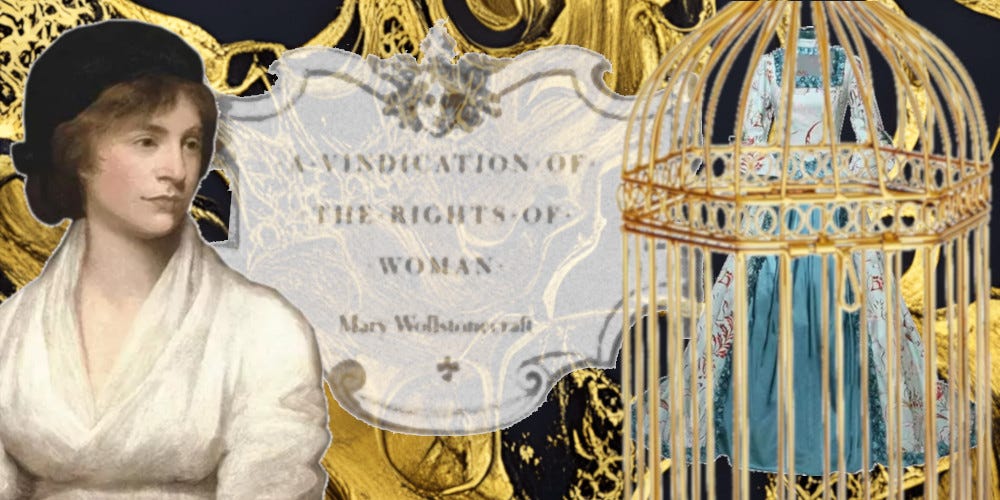The Gilt Cage
When did feminism lose its way...? The enduring legacy of Mary Wollstonecraft
“Taught from infancy that beauty is woman's sceptre, the mind shapes itself to the body, and roaming round its gilt cage, only seeks to adorn its prison.” - Mary Wollstonecraft, 1792
It is a paradox of our time that feminism is mandatory, its rejection tainted as abject degeneracy. Yet every feminist claims the movement failed, disagreeing solely about when and how. Those who belong to the ethos of the current generation of feminists defend transwomen and sex workers and thus accuse the ‘second wave’ feminists of the 1960s and 70s of failure because of their hostility towards both. Yet opponents to ‘transfeminism’ accuse the younger generation of failure for their apparent misogyny. Consider in this regard the innumerable death threats levelled against J.K. Rowling and the lack of condemnation this despicable tactic received. It is precisely this strife within the feminist movement that gave rise to the Rainbow Civil War, putting (older) gay and lesbian folks at odds with (younger) feminists who prioritise ‘queering gender’ and dismiss equality as ‘inequitable’.
This strange history has a beginning quite unlike where we are now. The writings of Mary Wollstonecraft inspired every thinker associated with the political battles for universal suffrage and equality of the sexes. While there is a direct continuity here, Wollstonecraft did not call herself a ‘feminist’ and would not recognise what happened after women won the vote as having any connection with her own philosophy. What’s more, the attempt to ‘claim’ Wollstonecraft for feminism is undermined by the fact that no feminist today reads or cites Wollstonecraft. This cannot even be blamed on the fact that she (like most Enlightenment thinkers) was a Christian and thus engaged in theological arguments within her blockbuster 1792 sequel, Vindication of the Rights of Women. No, that would require that anybody today might read Wollstonecraft to discover this!
Today, if Wollstonecraft is mentioned at all it is because her daughter was ‘the mother of science fiction’, Mary Shelley. Yet in her day, Wollstonecraft was an extremely significant figure in political philosophy. Her troubled upbringing led her to seek her own fortune, and she educated herself through books. A Presbyterian, she became a key voice among the ‘Rational Dissenters’ and participated in the the correspondence among intellectuals throughout Europe and the Americas known as ‘the Republic of Letters’. Amongst others, she exchanged letters with William Blake, Thomas Paine, and William Godwin - whom she eventually married, and was Mary Shelley’s father.
Wollstonecraft’s 1790 pamphlet A Vindication of the Rights of Men was written expressly to oppose Edmund Burke’s defence of monarchy and tradition, and its sequel pursued the consequences of Enlightenment reason for ‘the other sex’. As the opening quote makes clear, women in 18th century ‘polite society’ were little more than ornaments for men to acquire through marriage. The emphasis on beauty and grace seemed to Wollstonecraft akin to the construction of a prison - the gilt cage - which by its very nature discouraged women to develop their virtues.
In a passionate and convincing series of arguments, Wollstonecraft proposed that women shared the same God-given reason as men, and therefore needed to be educated like men, since otherwise they could not develop their virtues. Indeed, she argued that “elegance is inferior to virtue”, and that both women and society as a whole would be enriched by developing “the degree of the reason, virtue, and knowledge” that constitute “the perfection of our nature and capability of happiness”. To my knowledge, nobody today is proposing that we stop educating women - although such is the sort of dystopian phantasy that intrudes into science-fiction’s bitterness about religious traditions! Through the education of women, Mary Wollstonecraft’s key philosophical goal was eventually fulfilled.
Her legacy is the ideal of equality between the sexes - the treating of all humans as of equal worth and bound by reason to uphold the principles that can unify society despite its conflicting perspectives. Yet once feminists break with principles of equality, it becomes hard to see these movements as anything but partisan bickering. Labelling Wollstonecraft as ‘the first feminist’ is unkind if we are to treat these loosely connected practices as a single metamorphosing tradition - but not if we treat her ‘feminism’ solely as a facet of the Enlightenment movement towards equality for all. In this sense alone, feminism has unequivocally triumphed. How unfortunate that the political momentum it gathered went on to unravel the unifying principles Wollstonecraft forged as a key for escaping the gilt cage.




Thanks for writing something on this fraught subject. We've come to loggerheads before on the claim that feminism was ever about equality or even universal suffrage. I'm not going to reopen that subject. My take on the internal strife now afflicting the feminist movement is that it's a necessary stepping stone on the way to a more balanced view of the sexes. Until recent ruptures in notions of gender equality, feminist literature could not be read critically. Now feminism is pressed to look at itself, which is a first step toward positive inner development. Once the bickering is on display, folks are driven to think about where they stand and why. This is one of the magic elements of literature: it can provide a mirror to a culture, a way of becoming self aware. Unfortunately, this positive side of the conflict is being undermined by social media, which has its own magical way of destroying self awareness as one is too easily enticed into losing oneself in tribal affiliations.